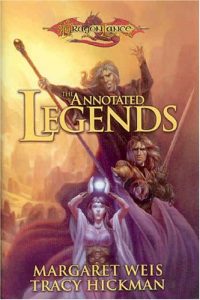 Previously, I claimed that the Dragonlance Chronicles stood head and shoulders above most of what I was reading at that time (other TSR books, Piers Anthony, etc.). I made this claim with perfect honesty and no malice aforethought. Be that as it may, it falls under that thing that we classify as ‘damning with faint praise’.
Previously, I claimed that the Dragonlance Chronicles stood head and shoulders above most of what I was reading at that time (other TSR books, Piers Anthony, etc.). I made this claim with perfect honesty and no malice aforethought. Be that as it may, it falls under that thing that we classify as ‘damning with faint praise’.
To my delight, I still find that the Dragonlance Legends are genuinely good in their own right, better than some of the books that lie ahead on my reading list over the next few months. They’re not great, or life-changing, or even wonders of prose. But they tell a story personal enough to satisfy people with no interest in the sci-fi/fantasy genre (y’know, if they were to read it, which they would not) with a scope that is epic enough to satisfy people who would refuse to read anything else. I find that usually the balance is not there. And there’s something about a good story that allows me to forgive the occasional mistakes in execution, which of course existed. I mean, yeah, I like it a lot, but it’s still from TSR.
This is all good news for me, because the annotative part of the book was a lot less well done than in the previous volume. The authors did fine, of course, as one would expect, and the poet guy too. Instead of comments all over from the design team, though, there’s one unidentified annotator covering everything else. And everything else consists of, in this case, pointing bright flashing neon signs at already sufficiently obvious thematic elements, removing any hope of subtlety. That, and pausing at any point where a moment from the past has been referenced in the text to explain exactly in what book and chapter said event first occurred. This “helpful” dissemination of information eventually came to include references to earlier points in the current book. Seriously. So, so aggravating. And I couldn’t even find a name of someone to blame, anywhere in the book.